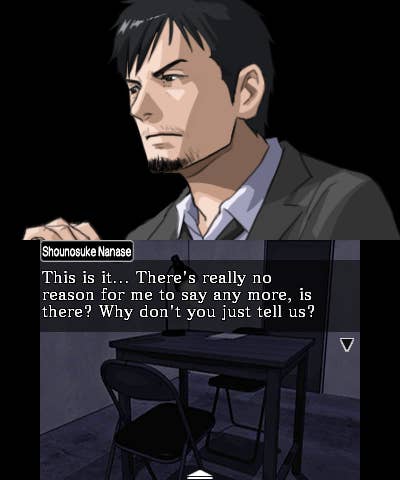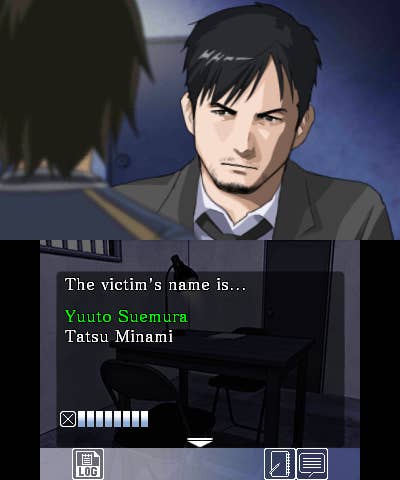Chase: Cold Case Investigations ~ Distant Memories ~ 3DS Review: Short Story
The successor to defunct developer Cing's emotional adventure games can't help but feel like a pretender to the throne.
This article first appeared on USgamer, a partner publication of VG247. Some content, such as this article, has been migrated to VG247 for posterity after USgamer's closure - but it has not been edited or further vetted by the VG247 team.
While they only existed for a scant five years in America, I really enjoyed the mopey, talky adventure games produced by the now-defunct Japanese developer Cing. While their puzzles were typically mediocre at best, titles like Hotel Dusk and Last Window carried a listless, melancholy spirit that made them feel incredibly human.
Cing went the way of the dodo back in 2010, but six years later, Taisuke Nanasaki, the director of their Kyle Hyde games—the aforementioned Hotel Dusk and Last Window—has returned to craft a spiritual successor to his unique brand of adventure games. Now working under the auspices of Aksys, and with a much smaller budget, Nanasaki's Chase: Cold Case Investigations sets out to pick up exactly where detective Kyle Hyde left off—albeit with a palette swap doppelganger as the protagonist. But despite how well C:CCI captures the tone of Nanasaki's previous works, the absolutely brain-dead puzzles and unexpectedly abrupt ending make his latest game a supreme disappointment.
As the title implies, Cold Case Investigations centers on unsolved mysteries: crimes abandoned by the authorities due to a complete lack of leads. Our hero Shounosuke Nanase and his assistant take it upon themselves to tackle these impossible mysteries, even if Nanase himself doesn't seem very motivated. The entirety of C:CCI takes place in their cramped office, with Nanase interviewing a series of suspects and mulling over evidence in an attempt to find the truth. While this setting can feel somewhat claustrophobic, Nanase and his assistant keep things lively by bouncing off of each other in an entertaining way: He's rough around the edges with a heart of gold, and she's a consummate professional put off by his unprofessionalism. (Even if he gets the job done.)
In terms of presentation, C:CCI attempts to ape the look of Nanasaki's past games, even if he doesn't quite have the budget this time around—his previous works would typically use live-action actors rotoscoped to look like something straight out of the famous "Take on Me" music video. For the most part, this pretty basic presentation gets the job done, since C:CCI doesn't aspire to be anything more than a glorified visual novel. It's a game almost entirely about conversations, meaning you don't need to see much outside of two characters flapping their lips at one another.

While the step down in presentation from Cing's established standard comes as a bit of a disappointment (though an expected one), the much bigger step down in game design is pretty crushing. Simply put, C:CCI feels like a reading comprehension game: Characters typically figure things out for themselves, though every once in awhile you'll be prompted when one of them forgets a name or a date. Sometimes, there's a bit more deduction involved, but the right answer out of the list of options you're given is always immediately obvious. There's one Ace Attorney-style puzzle that has you investigating a picture of a crime scene, but said picture is so poorly rendered, I ended up brute-forcing it by clicking on every hotspot until I inevitably stumbled upon the right area of that visual mess.
To its credit, C:CCI contains a pretty good locked-room mystery, with plenty of intriguing characters, each with their own possible motives. Unfortunately, much of the atmosphere ends up being lost in the game's poor localization, which opts for a dry and overly literal interpretation of the original Japanese script. Nanase's tendency to repeatedly use the inexplicable phrase "flower language" when referring to what a certain kind of flower symbolizes definitely points to a localization that desperately needs a second pass. Coming off of an extremely well localized game like Ace Attorney: Spirit of Justice, C:CCI couldn't help but feel like a product of an entirely different era.

Despite the poor localization, C:CCI had me slightly hooked for its first ninety minutes—so I was kind of shocked to discover those are its only ninety minutes. To say C:CCI ends abruptly would be a major understatement: What's contained in this digital release feels like the prologue of a much larger game, to the point where it establishes mysteries about Nanase's past that never see a resolution. I'd be slightly less disappointed if C:CCI presented itself as an episodic game, but as far as I know, that's all she wrote. In its current form, C:CCI comes off as a polished-up prototype for a full game Nanasaki couldn't successfully pitch to a publisher.
Occasionally, moments of Cing's former brilliance shine through in C:CCI, but these redeeming qualities are often drowned out by the low budget, bad localization, and thoughtless design. Director Nanasaki thrived in the DS era, where an extremely popular platform looking to find an audience outside of the traditional "gamer" allowed him to produce big, beautiful games full of strange ideas. With Cold Case Investigations, though, we have a clear case of a creative force struggling to adapt.
InterfaceYou won't be doing more than reading dialogue and occasionally making a selection, and Cold Case Investigations makes this pretty effortless.
Lasting AppealWith no alternate narrative branches or alternate endings, there's really no reason to give this adventure a second go.
SoundThe great, moody soundtrack amounts to the most redeemable element of Cold Case Investigations.
VisualsFor the most part, the visuals get the job done—you don't need to do much to convincingly render a conversation between two people.
ConclusionWhile the brilliance of its director's past games occasionally surface in Cold Case Investigations, this thoughtlessly designed and incredibly brief adventure will do nothing but disappoint fans of the defunct developer Cing.

